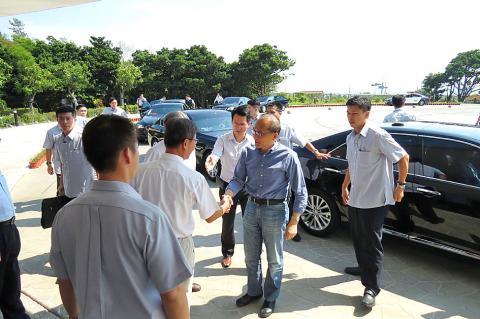The government will not extend the operating life of two of the nation’s nuclear power plants, Premier Lin Chuan (林全) said yesterday, while promising that electricity supply would remain stable.
During a visit to the Taipower Exhibit Center to meet with residents of New Taipei City — where the two plants are — to discuss issues such as dealing with nuclear waste, Lin said that the Jinshan Nuclear Power Plant in Shihmen District (石門) and the Guosheng Nuclear Power Plant in Wanli District (萬里) would be phased out according to the government’s schedule.
According to the schedule, the No. 1 reactor at the Jinshan plant is to shut down on Dec. 5, 2018, followed by the phasing out of the No. 2 reactor on July 15, 2019; and the Guosheng plant’s No. 1 and No. 2 reactors are to end operations on Dec. 27, 2021, and March 14, 2023, respectively.

Photo: Yu Chao-fu, Taipei Times
Lin sparked controversy in June when he said consideration should be given to restarting the first reactor at the Jinshan plant to ensure electricity supply during the peak summer season.
Lin yesterday said that one of the two reactors at each plant are already out of service and the government is pushing to transform the nation’s power supply structure.
He said that several options are available to ensure a stable supply of electricity.
“Currently, there does not seem to be a problem,” he said.
The first reactor at the Jinshan facility has been suspended since December 2014 after it underwent major maintenance. One of the reactors at the Guosheng plant has been out of service since April, when it also underwent major maintenance, but encountered a glitch in its electrical system.
Taiwan has three active nuclear facilities.
According to the policy of President Tsai Ing-wen’s (蔡英文) administration to create a nuclear-free homeland, Taiwan’s three operational plants are scheduled to be decommissioned by 2025, while the nearly completed Fourth Nuclear Power Plant in Gongliao District (貢寮), New Taipei City, is to remain mothballed.
Nuclear power has traditionally accounted for nearly 20 percent of Taiwan’s electricity production, raising questions about what will replace it when it is phased out.

Taiwanese actress Barbie Hsu (徐熙媛) has died of pneumonia at the age of 48 while on a trip to Japan, where she contracted influenza during the Lunar New Year holiday, her sister confirmed today through an agent. "Our whole family came to Japan for a trip, and my dearest and most kindhearted sister Barbie Hsu died of influenza-induced pneumonia and unfortunately left us," Hsu's sister and talk show hostess Dee Hsu (徐熙娣) said. "I was grateful to be her sister in this life and that we got to care for and spend time with each other. I will always be grateful to

REMINDER: Of the 6.78 million doses of flu vaccine Taiwan purchased for this flu season, about 200,000 are still available, an official said, following Big S’ death As news broke of the death of Taiwanese actress and singer Barbie Hsu (徐熙媛), also known as Big S (大S), from severe flu complications, the Centers for Disease Control (CDC) and doctors yesterday urged people at high risk to get vaccinated and be alert to signs of severe illness. Hsu’s family yesterday confirmed that the actress died on a family holiday in Japan due to pneumonia during the Lunar New Year holiday. CDC Deputy Director-General Tseng Shu-hui (曾淑慧) told an impromptu news conference that hospital visits for flu-like illnesses from Jan. 19 to Jan. 25 reached 162,352 — the highest

TAIWAN DEFENSE: The initiative would involve integrating various systems in a fast-paced manner through the use of common software to obstruct a Chinese invasion The first tranche of the US Navy’s “Replicator” initiative aimed at obstructing a Chinese invasion of Taiwan would be ready by August, a US Naval Institute (USNI) News report on Tuesday said. The initiative is part of a larger defense strategy for Taiwan, and would involve launching thousands of uncrewed submarines, surface vessels and aerial vehicles around Taiwan to buy the nation and its partners time to assemble a response. The plan was first made public by the Washington Post in June last year, when it cited comments by US Indo-Pacific Commander Admiral Samuel Paparo on the sidelines of the Shangri-La Dialogue

Suspected Chinese spies posing as Taiwanese tourists have been arrested for allegedly taking photographs of Philippine Coast Guard ships, local media reported. The suspected spies stayed at a resort in Palawan, where from a secluded location they used their phones to record coast guard ships entering and leaving a base, Philippine TV network GMA said on Wednesday. Palawan is near the Spratly Islands (Nansha Islands, 南沙群島) and other disputed areas of the South China Sea, where tensions have been on the rise between China and the Philippines. The suspects allegedly also used drones without permission and installed cameras on coconut trees in the